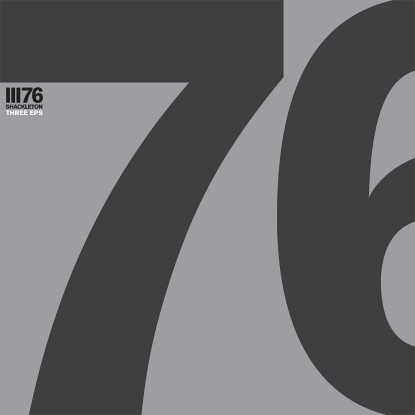Shackleton’s changed. And not in the way you might expect. As the ever-fickle genre of dubstep explodes and splinters into tiny little fragments all around him, he’s utterly defiant. Other producers are discovering the joy of things other than deep bass and loping rhythms, as they pile new element upon new element, as they begin to let influences of psychedelia infiltrate into the music… Shackleton doesn’t. He and frequent collaborator Appleblim have always been a bit off in their own world, so it’s not entirely unprecedented, but surprising nonetheless. It’s hard to call his music “dubstep” without any sort of caveat or footnote; Shackleton’s particular brand has always been very clinical and alienating, leaning more towards a looser sort of techno than anything. It’s hard to give it a proper classification; too much smoke to be techno, too little smoke to be dubstep.
Classifiable or not, Shackleton does have a signature sound. Minimal is the key term, though not in the Villalobos, microhouse sort of way. Instead of playing with the spaces and vacuums between sound, Shackleton is content to just leave the spaces, empty, gaping holes. His music, most of it released on his own Skull Disco label, has always had a peculiar middle eastern flavour to it, sounding somewhat exotic while distinctly alien. Couple that with foreboding spoken word snippets, and you have some unfriendly, vaguely frightening techno. But pay attention and you’ll notice that Three EPs is not a Skull Disco release. It’s a Perlon release, the label run by, guess who, Ricardo Villalobos. Accordingly, Shackleton has toned down his sound, shorn of most of its cultural references, and pared it to its very essence, a potent one at that.
That Middle Eastern influence is admittedly still present, though it’s much subtler — some Indian percussion sprinkled throughout (“Let Go,” “Mountains of Ashes”) and pseudo-Arab song titles (“Asha in The Tabernacle”). The music is less foreboding now, too. The sound is cleaner — no more murky stoner haze — and even the spoken word snippets are less negative and a whole lot less creepy. The opener is titled “(No More) Negative Thoughts!” as if to hit the listener over the head from it right from the beginning. Shackleton has turned inward on this album, and his music is now just coldly mechanistic rather than exotic. It doesn’t make it any harder to relate to; if anything, Three EPs is so impressive because it manages to be so moving despite its relative frigidity. The opening track almost approaches brightness: clanging, whiny synths encircling and interrogating a repetitive speech sample that sounds much more human and well-adjusted than we’re used to.
The songs here are a mix of the familiar and the new, though all imbued with the new aesthetic Shackleton has developed. “Let Go” and “Moon Over Joseph’s Burial” are more of what might be expected from the London producer, but they’re not retreads. The latter features a hypnotic, melodic bassline that wouldn’t sound out of place on Aphex Twin’s Selected Ambient Works 85-92. Both tracks emphasize lively percussion floating over thinly-spread bass frequencies; the two feel disconnected, as if the lower frequencies are taken from one track and the percussion another, but the disconnect is never disorienting. Rather, it serves to be completely breathtaking and exciting. “It’s Time For Love” is an exploration of incredibly low frequencies in a techno context, and the massive, deep percussion belies a certain creepy sensuality. The two real standouts here are the primary divergences, however; “There’s A Slow Train Coming” is a slow, menacing ambient track featuring very little in the way of beats, but packs a major wallop with creeping, creaky bass and a mood that would make Lustmord a little scared. And “Trembling Leaf” is an exercise in rhythm-anchored formlessness, where barely tenable percussion manages to sound wholly natural and at the same time completely out of sync, out of rhythm, lacking bass or any sort of musical grounding aside from a skewed dubstep rhythm that comes in halfway through.
The entire package (3 12” EPs or 1 CD) is endlessly rewarding, if not a little exhausting. The album has a stellar flow, never stacking too many similar tracks on top of each other, and the tempos vary enough to give it that “album” feeling, something which seems to elude many of dubstep’s big names. Shackleton has managed to infuse an already-signature aesthetic with new elements and has created an otherworldly sound, as much in tune with with the Middle East as it is with outer space. The music is spartan and sometimes monochromatic, but don’t you dare call it simple. Its extensive depth and complexity is revealed through its surprising emotionality and the movement it inspires, both in the feet and in the heart.

